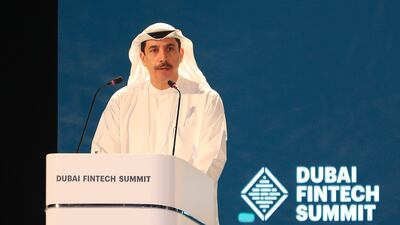The FinTech sector has emerged as a main contributor to the Dubai International Financial Centre’s growth and has helped the financial centre to outpace the emirate’s economic expansion over the past few years, the governor of the DIFC has said.
The DIFC, one of the top financial centres in the Middle East, Africa and South Asia region, has become a “major engine of growth” for Dubai's economy and a significant contributor to its gross domestic product, Essa Kazim told delegates at the FinTech Summit on Monday.
The financial centre has been expanding fivefold faster than the emirate's average gross domestic product growth over the past 10 years, contributing about 6 per cent to its GDP, Mr Kazim said in his keynote address in Dubai.
“A key growth driver over the past three years has been FinTech and innovation companies contributing over 27 per cent to the centre’s overall client growth."
The sharp growth in the emirate’s FinTech industry is in line with Dubai’s D33 economic agenda, which aims to double the size of Dubai’s economy, with financial, trade and investment targets of Dh32 trillion ($8.71 trillion) over the next decade.
The overarching growth road map also aims to propel the emirate into the world's top four financial centres.
Dubai's economy expanded by 4.6 per cent on an annual basis in the first nine months of 2022, according the emirate's statistics centre.
Emirates NBD estimates Dubai's full-year growth for 2022 at 5 per cent and expects its GDP to grow by 3.5 per cent in 2023.
The DIFC grew at a record pace last year, with the number of active registered companies climbing by 20 per cent while the financial centre's annual revenue exceeded Dh1 billion for the first time.
The number of active registered companies in the DIFC rose to 4,377, almost doubling from the 2019 pre-coronavirus level of 2,431.
New companies registered in DIFC last year surpassed 1,000 for the first time since its inception.
FinTech and innovation was the fastest-growing sector in the DIFC last year, with the total number of companies in the sector growing 36 per cent to 686.
Mr Kazim attributed the fast growth of the FinTech industry to the “proactive approach taken by policymakers”.
Government entities are mandated to provide the right ecosystem to enable innovation, testing, investment, and growth, and that is the reason why DIFC has invested heavily in its FinTech ecosystem, he said.
With demand for digital payments and other FinTech services continuing to grow, DIFC FinTech and innovation companies raised more than $615 million in funding last year, Mr Kazim said on Monday.
Since the onset of Covid-19, people have turned to online banking services and other contactless technology to transfer money and pay for e-commerce transactions, boosting the FinTech sector.
The industry is expected to double in size to about $270 billion in 2027, from more than $135 billion in 2021, in the wider Middle East, Africa and South Asia region, according to the DIFC FinTech Hive 2022 report.
Globally, digital payments are expected to grow to $8.26 trillion by 2024, from $4.4 trillion in 2020, according to Statista's data.
The DIFC will continue to invest heavily in its FinTech ecosystem by creating a “supportive and agile regulatory framework, providing access to funding, sandbox environments and resources for start-ups and established companies alike”, Mr Kazim said.
“As we move towards an ever more digitally connected world, FinTech is destined to play a significant role in shaping the financial landscape, and Dubai is well positioned to lead the way in this exciting and dynamic sector,” he said.


